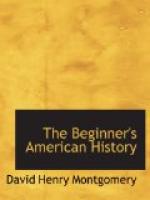Marshall set to work, and before the end of January, 1848, he had built a dam across the river and got the saw-mill half done. One day as he was walking along the bank of a ditch, which had been dug back of the mill to carry off the water, he saw some bright yellow specks shining in the dirt. He gathered a little of the sparkling dust, washed it clean, and carried it to the house. That evening after the men had come in from their work on the mill, Marshall said to them, “Boys, I believe I’ve found a gold mine.” They laughed, and one of them said, “I reckon not; no such luck.”
[Illustration: CAPTAIN SUTTER’S SAW-MILL AT COLOMA, WHERE GOLD WAS FIRST FOUND.]
[Footnote 3: Coloma (Ko-lo’ma): see map in paragraph 236.]
238. Marshall takes the shining dust to Captain Sutter; what he did with it, and how he felt about the discovery.—A few days after that Marshall went down to the fort to see Captain Sutter. Are you alone? he asked when he saw the captain. Yes, he answered. Well, won’t you oblige me by locking the door; I’ve something I want to show you. The captain locked the door, and Marshall taking a little parcel out of his pocket, opened it and poured some glittering dust on a paper he had spread out. “See here,” said he, “I believe this is gold, but the people at the mill laugh at me and call me crazy.”
Captain Sutter examined it carefully. He weighed it; he pounded it flat; he poured some strong acid on it. There are three very interesting things about gold. In the first place, it is very heavy, heavier even than lead. Next, it is very tough. If you hammer a piece of iron long enough, it will break to pieces, but you can hammer a piece of gold until it is thinner than the thinnest tissue paper, so that if you hold it up you can see the light shining through it. Last of all, if you pour strong acids on gold, such acids as will eat into other metals and change their color, they will have no more effect on gold than an acid like vinegar has on a piece of glass.
For these and other reasons most people think that gold is a very handsome metal, and the more they see of it, especially if it is their own, the better they are pleased with it.
Well, the shining dust stood all these tests.[4] It was very heavy, it was very tough, and the sharp acid did not hurt it. Captain Sutter and Marshall both felt sure that it was gold.
But, strange to say, the captain was not pleased. He wished to build up an American settlement and have it called by his name. He did not care for a gold mine—why should he? for he had everything he wanted without it. He was afraid, too, that if gold should be discovered in any quantity, thousands of people would rush in; they would dig up his land, and quite likely take it all away from him. We shall see presently whether he was right or not.
[Footnote 4: Tests: here experiments or trials made to find out what a thing is.]




